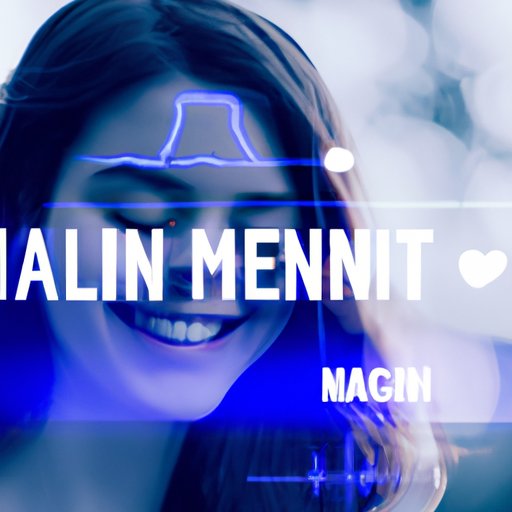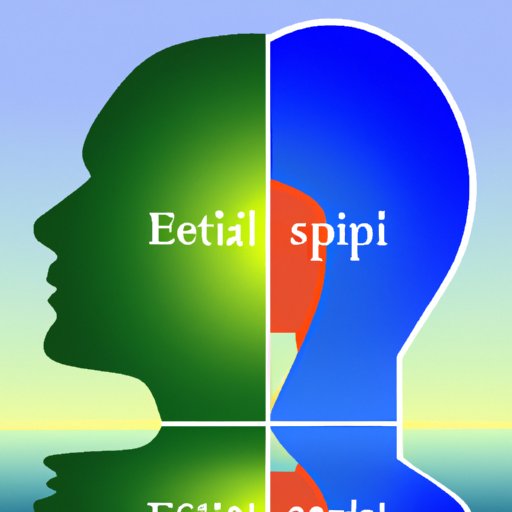Introduction
The intersection of “me, myself, and AI” is an increasingly relevant topic as advances in artificial intelligence (AI) technology continue to shape our lives. This topic refers to the ways in which AI is impacting our individual identities, self-reflection, self-expression, and personal development. In this article, we will explore the various implications of this intersection and what it means for humanity.
Exploring the Intersection of Me, Myself, and AI: What It Means for Humanity
As AI becomes more embedded in our lives, it is becoming a powerful tool for self-reflection and self-expression. AI can be used to track our habits and behaviors, analyze our emotions, and even provide personalized advice and guidance. This has had a profound effect on how we view ourselves and how we interact with others.
How AI is Changing the Way We Self-Reflect
AI is changing the way people self-reflect by providing them with real-time feedback and insights into their behavior. For example, AI-based tracking apps like Strava or Fitbit can show us how active we are and how much sleep we get. AI-based chatbots can also provide us with personalized advice and guidance based on our individual needs and preferences.
In addition, AI can be used to analyze our emotional states. Researchers have developed AI algorithms that can detect subtle changes in facial expressions and body language in order to better understand our emotions. This type of technology could be used to help people better understand their own feelings and reactions to different situations.
The Impact of AI on the Future of Self-Expression
AI is also having a major impact on the way we express ourselves. For example, AI-based image recognition technology can help us create more meaningful and engaging visuals for our social media posts. AI-based voice recognition tools can help us create more natural and expressive audio recordings. AI-based virtual assistants can help us organize our thoughts and ideas in a more efficient manner. The possibilities are endless.
In addition, AI can be used to generate creative works such as music and artwork. AI-based algorithms can learn from existing data and create original works that reflect the style and emotion of the data. This could revolutionize the way we create and consume art in the future.
Implications for Human Connections and Relationships
Finally, AI has the potential to significantly change the way we connect and relate to one another. AI-based chatbots and virtual assistants can help us stay connected with friends and family members who live far away. AI can also be used to facilitate conversations between people who have different backgrounds and perspectives.
AI can also be used to enhance online dating services. AI-based algorithms can be used to match people based on their interests, values, and personality traits. This could lead to more successful and fulfilling relationships in the future.

How AI Technology is Enhancing Mental Health Care
AI technology is also being used to improve mental health care. AI-based algorithms can be used to identify patterns and trends in patient data that may indicate depression, anxiety, or other mental health issues. AI-based chatbots and virtual assistants can also be used to provide personalized advice and guidance to those struggling with mental health issues.
Benefits of Using AI to Help with Mental Health Issues
One of the main benefits of using AI to help with mental health issues is that it can provide personalized advice and guidance to those who need it. AI-based algorithms can analyze an individual’s data and provide tailored advice and recommendations. This can help those struggling with mental health issues find the support they need more quickly and effectively.
In addition, AI can be used to detect early warning signs of mental health issues. AI-based algorithms can detect subtle changes in behavior that may indicate the onset of depression or anxiety. This can help mental health professionals intervene more quickly and provide the necessary treatment.
Challenges of Implementing AI in Mental Health Care
There are also some challenges associated with implementing AI in mental health care. One of the main concerns is privacy. AI-based algorithms can collect and store sensitive patient data, which raises ethical and legal issues. Additionally, AI-based algorithms can be biased if they are not trained on a diverse enough dataset.
Another challenge is accuracy. AI-based algorithms can make mistakes and produce inaccurate results. This can lead to incorrect diagnoses and treatments, which can be detrimental to a patient’s health. Finally, AI-based algorithms can be expensive to implement and maintain, which can be a barrier for some organizations.
Exploring the Possibilities of AI in Personal Development
AI is also being used to help individuals achieve their personal development goals. AI-based algorithms can be used to track progress towards goals and provide personalized advice and guidance. AI-based virtual assistants can also be used to remind people to stay on track and keep their motivation levels high.
Potential Applications of AI in Self-Development
One potential application of AI in self-development is goal setting. AI-based algorithms can be used to track progress towards goals and provide personalized advice and guidance. For example, AI-based chatbots can provide users with reminders and tips to help them stay on track.
In addition, AI-based algorithms can be used to analyze user data and provide personalized recommendations for improving performance. AI-based virtual trainers can also be used to provide one-on-one coaching and feedback to help individuals reach their goals.
Advantages and Disadvantages of AI in Personal Development
Like any technology, AI has both advantages and disadvantages when it comes to personal development. On the plus side, AI can provide personalized advice and guidance to help individuals reach their goals. AI can also be used to track progress and provide timely feedback. However, AI-based algorithms can be expensive to implement and maintain, and there is always the risk of bias due to limited datasets.
Conclusion
The intersection of me, myself, and AI is an increasingly relevant topic as advances in AI technology continue to shape our lives. AI is changing the way we self-reflect, the way we express ourselves, and the way we connect and relate to one another. AI is also being used to improve mental health care and to help individuals achieve their personal development goals.
In conclusion, AI has the potential to profoundly affect our individual identities, self-reflection, self-expression, and personal development. While there are still some challenges associated with implementing AI in these areas, the potential benefits outweigh the risks. As AI technologies continue to evolve, they will undoubtedly play an ever-increasing role in our lives.
(Note: Is this article not meeting your expectations? Do you have knowledge or insights to share? Unlock new opportunities and expand your reach by joining our authors team. Click Registration to join us and share your expertise with our readers.)
